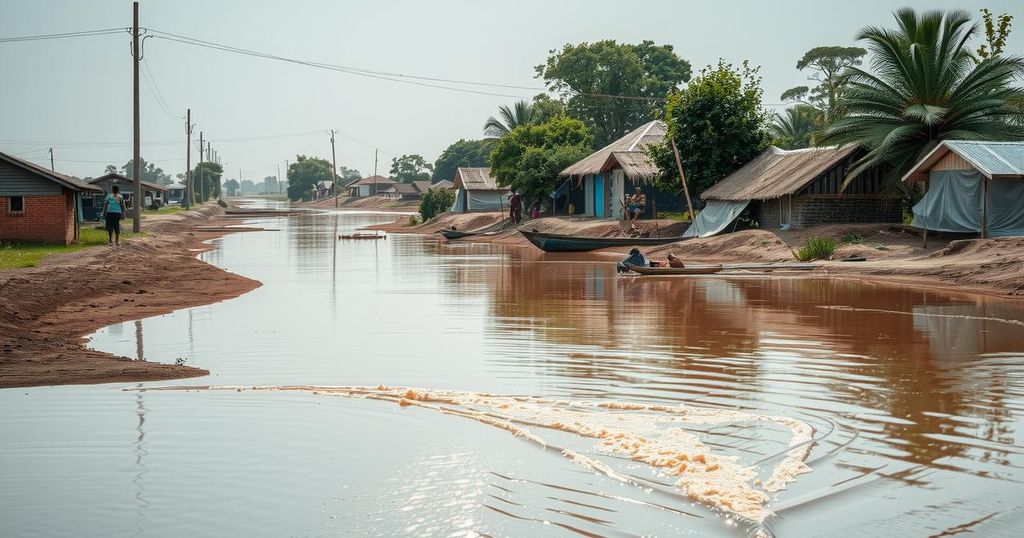Spain Floods: A Call for Climate Change Preparedness as a Global Imperative
Spain has recently experienced devastating floods linked to climate change, claiming numerous lives and highlighting significant infrastructure vulnerabilities. Climate scientists warn of increasing severity in weather events if global warming persists. Urgent calls for enhanced preparedness and global cooperation on emission reductions are necessary to combat the devastating effects of climate change.
As climate change progresses, the frequency and intensity of extreme weather events have reached alarming levels, exemplified by the severe floods in Spain that recently claimed numerous lives and caused extensive damage across the Valencia region. Climate scientists highlight a concerning trend: humanity has only experienced half of the new climate normal, with more catastrophic events anticipated if global warming is not curtailed. Therefore, addressing climate change preparedness must become a global priority. The catastrophic flooding that recently struck Spain resulted in at least 158 fatalities, and findings from World Weather Attribution indicate that human-induced climate change likely increased rainfall intensity by about 12 percent while doubling the odds of experiencing storms of this magnitude. The scientific consensus remains clear: a warmer atmosphere harbors more moisture, leading to increasingly severe rain when atmospheric conditions allow for its release. Projections suggest a possible temperature rise of 2.6 degrees Celsius by century’s end, which promises to further increase the severity and frequency of such extreme weather occurrences. The Mediterranean region, particularly countries like Spain, Italy, and Greece, stands on the frontlines of this climate crisis. Recent weather patterns, including the DANA phenomenon in Spain, illustrate how warm waters combined with atmospheric disturbances can create devastating rainfall. Despite early warning systems that could alert residents of impending storms, these measures proved insufficient in preventing loss of life, highlighting the need for enhanced public education and robust rapid-response infrastructures. Furthermore, extreme weather manifests a dual threat of droughts and floods. Areas like Chiva, near Valencia, have experienced a year’s worth of rain within mere hours, a development exacerbated by climate change’s interference with local water cycles. Prolonged droughts make soils unprepared for heavy rains, leading to destructive flash floods, thereby creating dire living conditions in these communities. Spain’s flooding has exposed critical vulnerabilities within both infrastructure and emergency response systems. Delays in public warnings resulted in tragic outcomes, forcing residents to seek refuge on rooftops as floodwaters elevated their surroundings. Rapid urban development has further exacerbated the situation, as communities have been constructed on floodplains and riverbeds, enhancing their vulnerability to flooding disasters. European Commission President Ursula von der Leyen has articulated the necessity for increased preparedness, stating that “preparedness must become part of the underlying logic of all our actions.” In response to these ongoing challenges, there is urgent need to transition from mere awareness to decisive action. Effective strategies must encompass community-level preparedness and infrastructure investments to address the risks of extreme weather. Countries that have successfully mitigated natural disaster impacts, such as Japan and the Netherlands, showcase the feasibility of innovative infrastructural solutions that can enhance resilience even in disaster-prone regions. The broader implications of climate-related events in Spain reflect a global environmental crisis necessitating international cooperation. While domestic policies are crucial, global collaboration in reducing greenhouse gas emissions is vital to alleviate the underlying causes of these disasters. The upcoming UN COP29 climate summit in Azerbaijan presents an essential opportunity for countries to reaffirm their commitment to emission reduction targets. Experts emphasize that reducing emissions and promoting sustainable energy sources must remain central to global climate discussions. Ultimately, the recent floods in Spain underscore that the climate crisis is a current and pressing threat rather than a distant concern. As nations grapple with extreme weather effects, the need for stringent environmental policies, effective emergency response systems, and sustainable planning is increasingly critical. The urgency for climate preparedness must lead every government’s agenda, and world leaders are called upon to make substantial commitments to safeguard their citizens amid a climate in turmoil. Moving forward, global efforts must prioritize climate resilience through significant reductions in emissions and the investment in necessary infrastructure to protect vulnerable communities.
The article addresses the pressing issue of climate change and its relation to extreme weather events, particularly in Spain where recent floods have highlighted significant vulnerabilities in infrastructure and preparedness. As global warming continues to escalate, the frequency and intensity of such disasters are expected to worsen. Through examination of scientific findings, the article discusses the implications of climate change on rainfall patterns in southern Europe and emphasizes the dual threat posed by droughts and floods, urging the integration of climate resilience into planning and policy decisions.
In conclusion, the floods in Spain represent a dire warning of the increasing severity of climate-induced weather events. The need for comprehensive preparedness strategies is paramount to safeguard lives and infrastructures. By advancing public education, enhancing emergency response systems, and committing to global cooperation on emission reductions, it is possible to mitigate the harsh realities of the climate crisis. The imperative for every government is clear: proactive measures must be prioritized to ensure a resilient future amidst ongoing climate challenges.
Original Source: www.policycircle.org




Post Comment